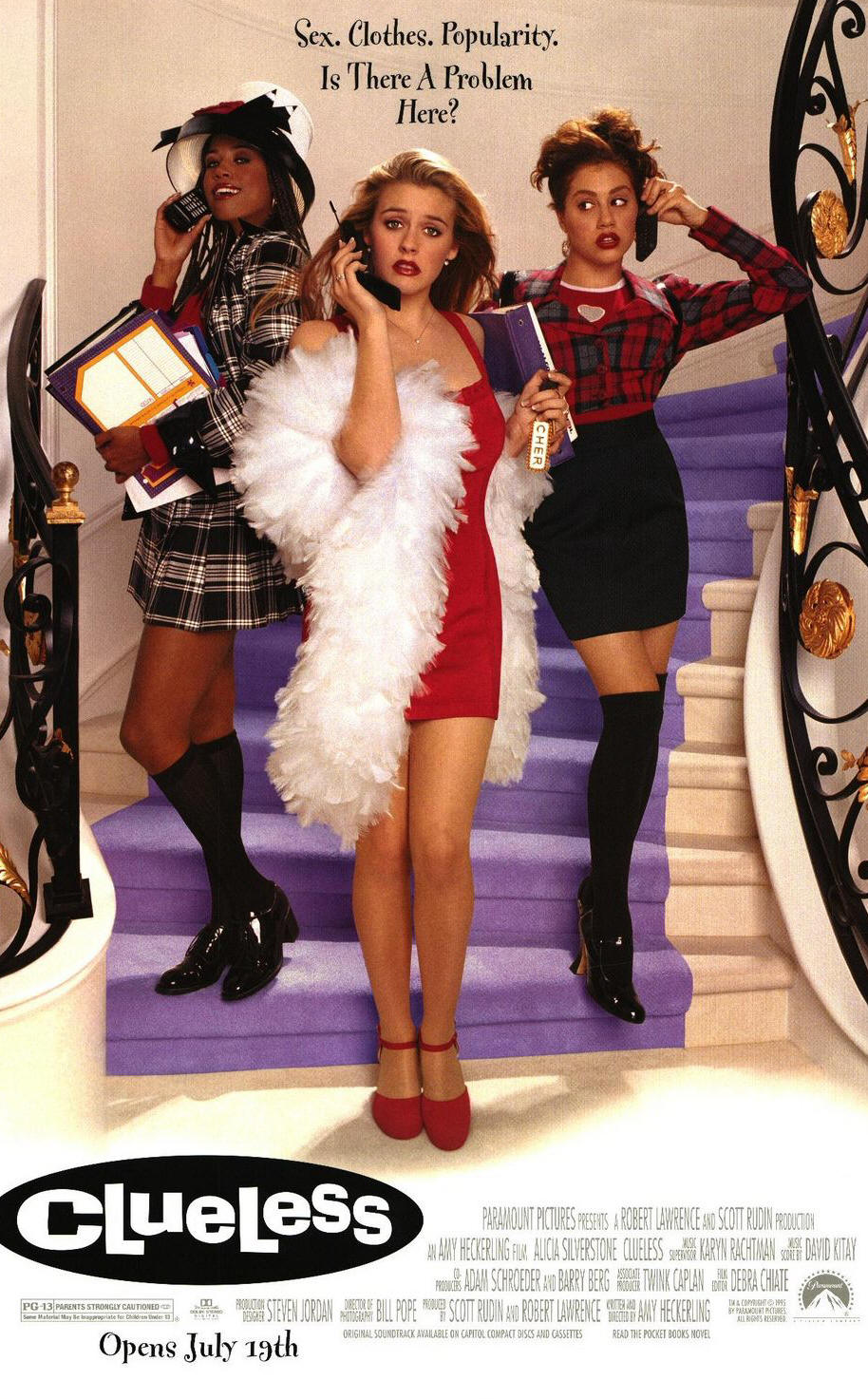Written by Robin Hitchcock
With Bitch Flicks celebrating its fifth anniversary this week, I wanted to write a positive and celebratory post. So I thought I would revisit one of my favorite flicks, Amy Heckerling’s Clueless, for which I have not a single unkind word.
 |
| Clueless movie poster |
Clueless repositions the basic plot of Jane Austen’s Emma into a Beverly Hills high school. Like Austen’s title character, Clueless‘s heroine Cher (Alicia Silverstone) is a somewhat spoiled rich girl who operates in her own reality, one slightly off-kilter from everyone else’s perception of the world. But she is not stupid, or unkind, or even particularly egotistic. Although her matchmaking and various schemes to help others are almost always somewhat self-motivated, you wouldn’t call her selfish (not to her face). Cher is an extremely likeable (and relentlessly quotable) character. This entire movie could have easily been an exercise in “look at this dumb shallow bitch,” but Heckerling’s affection for her character (echoing Austen’s for Emma) and Silverstone’s charisma sidestep that antifeminist pitfall.
 |
| Dionne and Cher |
Another delightfully feminist feature of Clueless is its depiction of female friendships. There are plenty of romantic subplots to go around in this movie, but the most important relationships are between Cher and her best friend Dionne (Stacey Dash) as well as Cher and her new friend/”project” Tai (Brittany Murphy). These relationships show a lot of love, mutual support, and genuine enjoyment of time spent together, reflecting real-life female friendships in a way that is STILL woefully underrepresented in media. But these friendships are not devoid of conflict or competitiveness, which also rings true. One of my favorite scenes is when Cher and Tai make up after a blowout fight, a conversation beginning with shy small talk but quickly escalating to mutual apologies and tearful appreciation of one another. Who hasn’t had this moment with their best girlfriend?
 |
| Cher and Tai make up after a fight |
Clueless also boasts an exceptionally nuanced and respectful depiction of teen sexuality. When Cher, Dionne, and Tai discuss their respective levels of sexual experience (Tai has had sex, Dionne is “technically a virgin”, and Cher is “saving herself for Luke Perry”), no one’s choices are judged. Later, when Cher finds out the guy she’s crushing on is gay, she’s surprised but almost immediately embraces him as a close platonic friend.
In general, Clueless is extremely respectful of its teen characters, even as it satirizes their naïveté and superficial tendencies. Cher can be ditzy but still corrects a pretentious college student’s misquotation of Hamlet. Dionne’s boyfriend Murray is able to eloquently justify calling her “woman”: “street slang is an increasingly valid form of expression. Most of the feminine pronounces do have mocking, but not necessarily misogynistic undertones.” Tai marvels, “you guys talk like grown-ups.” This was three years before Dawson’s Creek forced awkwardly sophisticated through it’s teen mouthpieces, and leagues more successful.
Heckerling’s unexpected adaptation worked so well that Clueless launched an entire sub-genre of the high school-set classic literary adaptations; yielding everything from the delightful 10 Things I Hate About You (a take on The Taming of the Shrew), to the enjoyable but problematic She’s All That (one of Hollywood’s many Pygmalion adaptations), the drearily self-serious Cruel Intentions (Les Liaisons Dangereuses), and the brutally faithful O (Othello). And that’s a significantly abbreviated list (anyone else remember A Midsummer Night’s Dream-inspired Get Over It? Sisqó was in it! Does anyone else even remember Sisqó?). I for one would love to see a revival of this trend. If we’re going to bring back floral prints from the graveyard of the 1990s, why not this?
I strongly suspect there was some kind of magic radiation on set that dramatically slowed the aging process in the main cast, because Paul Rudd and Stacey Dash are basically the male and female poster children for “ageless,” and Alicia Silverstone and Donald Faison are still looking remarkably fresh faced themselves. [And now, I shall pour one out for gone-too-soon Brittany Murphy. RIP] But that is neither here nor there. Clueless is timeless not because of its preternaturally ageless cast, but because it is much more than just the cultural parody it appears to be at first blush.

I’d like to point out that Tai uses the idea of virginity to shame Cher during their fight: “You’re a virgin who can’t drive.” Not sure if it’s intended to be tongue-in-cheek or ironic since her character is somewhat naive and it’s a moment of anger, but nonetheless, it goes against your claim that “no one’s choices are judged.”
What a great post, Robin. I feel the same way about the movie: not an unkind word to say. It IS still fresh, and still important. I wish Amy Heckerling’s ‘Vamps’ had a better distribution deal, as it shares a lot in common with ‘Clueless’ (aside from Silverstone), particularly female friendship.
Kudos, and thanks for this post.
I think Robin’s point was that the text does not judge any of the character’s choices. Tai virgin-shames Cher, but we as the audience are not encouraged to agree with her in that moment.
Agreed. Tai feels the need to apologize profusely for the fight that climaxes with that comment, which I think reinforces the idea that it is not ok to shame people for their choices in their sex lives.